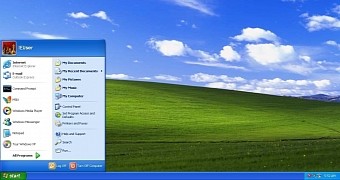Windows XP is an operating system that has a well-deserved place in technology history books, as it’s the version that completely changed how we worked on our computers.
Windows XP was a super-successful OS, there’s no doubt about it, and despite Microsoft giving up on its back in April 2014, users still weren’t ready to give up on it.
This is why Windows XP actually survived so many years after being let go, despite the obvious security risks of staying with a product that no longer receives security updates and patches. And while some users put other security measures in place, all in an attempt to remain secure on Windows XP even after the end of support, others did nothing in this regard, so their computers just remained vulnerable to potential attacks.
“Microsoft provided support for Windows XP for the past 12 years. But the time came for us, along with our hardware and software partners, to invest our resources toward supporting more recent technologies so that we can continue to deliver great new experiences. As a result, technical assistance for Windows XP is no longer available, including automatic updates that help protect your PC,” Microsoft warned.
“If you continue to use Windows XP now that support has ended, your computer will still work but it might become more vulnerable to security risks and viruses. Internet Explorer 8 is also no longer supported, so if your Windows XP PC is connected to the Internet and you use Internet Explorer 8 to surf the web, you might be exposing your PC to additional threats. Also, as more software and hardware manufacturers continue to optimize for more recent versions of Windows, you can expect to encounter more apps and devices that do not work with Windows XP.”
More than 6 years after its official demise, Windows XP is ready to go dark once and for all. The world is finally ready for a future without Windows XP, as its market share has dropped below 1 percent, with most devices already upgraded to a newer version of Windows.
Those that are still running Windows XP are no longer connected to the Internet, and technically, this can be considered another security measure to prevent a potential attack. The reason some people stick with Windows XP comes down to app compatibility, as internal apps built for Windows XP might require major updates to run on newer Windows.
But on the other hand, it’s not a secret that moving from Windows XP to newer Windows, in this case, Windows 8.1 or Windows 10 (Windows 7 is no longer supported either) requires investing in new hardware, something not everybody is willing to do. Microsoft too admits that moving to Windows 10 requires a new PC, and this is the only way to go in order to experience the new OS.
“If your current PC can't run Windows 10, it might be time to consider shopping for a new one. Be sure to explore our great selection of new PCs. They're more powerful, lightweight, and stylish than ever before—and with an average price that's considerably less expensive than the average PC was 14 years ago,” Microsoft says.
The good news is that most people out there have finally received the message, so Windows XP is now going dark, making room for newer operating systems. The bad news is that Windows 7 now takes Windows XP’s place as the unsupported operating system that users don’t want to abandon, so it remains to be seen how long it’ll take until this one goes dark too.

 14 DAY TRIAL //
14 DAY TRIAL //